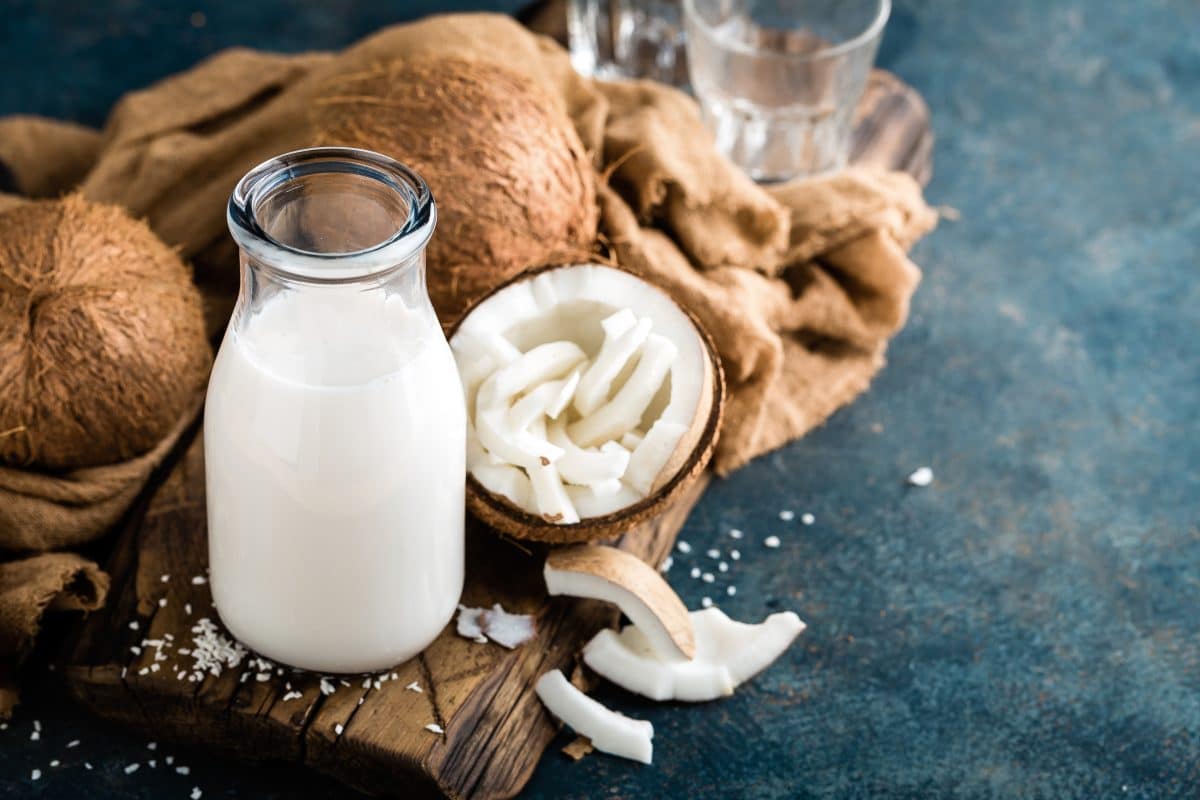Coconut milk FODMAP content
- Low FODMAP diet
If you are on the low FODMAP diet, you may wonder if coconut milk is low FODMAP.
This article will explain the FODMAP content of various types of coconut milk so that you can safely enjoy this milk when on the diet.

Does coconut milk contain FODMAPs?
Yes – coconut milk does contain FODMAPs.
However, there are different types of coconut milk, which can contain different types and quantities of FODMAPs. If you are following the low FODMAP diet or have an intolerance to fructans or sorbitol then scan down the list to see if the specific products are suitable for you.
UHT coconut milk FODMAP Content
UHT (Ultra High Temperature) coconut milk contains fructans, but according to Monash, people who are on the low FODMAP diet can have up to ½ cup at a time.
Servings larger than ½ a cup will be high in fructans and may cause symptoms (1).
Monash is the University based in Australia who invented the low FODMAP diet process. You can find out more about the low FODMAP diet and how it can help to diagnose food intolerances in our other article.
You may find it useful to have some UHT coconut milk in your pantry whilst on the low FODMAP diet, as this can be stored for long periods of time. UHT coconut milk consists of ground coconut mixed with water.
This mixture is then pressed to produce the coconut milk and heated to ≥130°C which is what stops it from going off as quickly as fresh milk (2).
Canned coconut milk FODMAP Content
Canned coconut milk FODMAP content is higher in FODMAPs due to the sorbitol content. Therefore, you should avoid it on the low FODMAP diet.
Sorbitol is a sugar but from the ‘polyol’ family which are sugar alcohols. Only a small amount of sorbitol is actually absorbed by the body. When sorbitol reaches the large bowel it can be fermented by gut bacteria – causing gas production and it also draws in water.
Sorbitol can cause symptoms of bloating, excess gas, loose stools and pain in people with IBS (3).
Sweetened coconut milk FODMAP content
Some coconut milk products have had high FODMAP ingredients and sweetener added to improve the flavour of their product. For any of the coconut milk listed above, always check the label.
Examples of high FODMAP sweeteners to avoid include:
- Sugar alcohols, including xylitol, mannitol and sorbitol (4) (5)
- Inulin, read more on inulin here: Inulin and the low FODMAP diet
For more information on the FODMAP content of sweeteners, read our article on which sweeteners are low fodmap?
Coconut milk Low FODMAP recipes
To enjoy a low FODMAP meal using coconut milk, why not try some of the following recipes. Each recipe contains coconut milk within the low FODMAP quantities outlined by Monash.
- Vegan Coconut & Pumpkin Curry with Roasted Chickpeas
- Chicken Madras Curry
- Easy to Make Coconut Tofu Curry
- LOW FODMAP CURRY – SPINACH AND BUTTERBEAN CURRY
Alternative Low FODMAP Plant-based Milks
If you’re looking for a low FODMAP milk that you can enjoy in larger quantities, the following options are suitable:
- Rice milk
- Almond milk
- Macadamia milk
You can read our blog post Does low fodmap milk exist? for more detailed information on low FODMAP milk.
Are other coconut products low FODMAP?
Other coconut-based products contain varying levels of FODMAPs depending on how they have been processed. The best way to find out if a product is suitable is to check the Monash app.
We have also written an article all about ‘is coconut low FODMAP?‘ which will give you the breakdown of each food’s FODMAP content.
What are fructans? – A FODMAP found in coconut milk
Fructans are a sugar called oligosaccharides making up the ‘O’ in FODMAP. The enzyme needed to break down fructans is lacking in humans, therefore, fructans are malabsorbed in the small bowel.
When they reach the large bowel, they are fermented by gut bacteria, resulting in IBS symptoms such as bloating and flatulence.
Is Coconut Milk Healthy?
Coconut milk is naturally high in fat and is a great source of fat-soluble vitamins (Vitamin A, D, E, K).
Coconut milk is also high in medium-chain saturated fatty acids, which may have a favorable effect on lipid profile (6).
One study found that coconut milk decreases the level of LDL (low-density lipoprotein) cholesterol (6). If raised, LDL-increases the risk of heart disease. Coconut milk also increases HDL (high-density lipoprotein) cholesterol, which carries excess cholesterol to the liver so that it can be removed from the body (6).
Regular cow’s milk has more vitamins and minerals including vit A, vit B12, vit K, vit D and vit C. Thus, if you are switching from cow’s milk to coconut milk make sure the coconut milk is fortified to get the added benefits.
Bottom Line
Coconut milk does contain FODMAPs, and the amount and type of FODMAPs vary depending on the type of milk. UHT coconut milk is low FODMAP at half a cup, whereas you should avoid canned coconut milk if on the low FODMAP diet or if you are sensitive to sorbitol.
Make sure that you read food labels to avoid buying coconut milk that contains high FODMAP ingredients such as sweeteners (7).
Some products that are made from coconuts, such as coconut cheese and coconut water, also contain FODMAPs. For coconut-based products, check the Monash app to find out what a low FODMAP serving size is.
Article written by Rida Mahmood, Dietitian and reviewed by Bethany Willson Specialist Gastroenterology Dietitian BSc Hons and Kirsten Jackson Consultant Dietitian BSc Hons, RD, PG Cert